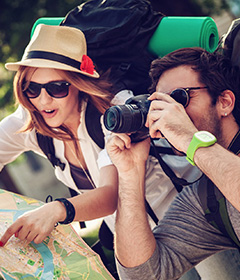Travel has long been viewed as a means of escape, relaxation, and discovery. However, recent research suggests that the true value of travel lies not in the perfection of the destination, but in the depth and uniqueness of the experiences we encounter. This shift in perspective challenges traditional notions of luxury travel and opens up new possibilities for personal growth, memory formation, and long-term satisfaction.
Psychological impact of experiential travel on long-term memory formation
The human brain is wired to remember novel experiences more vividly than routine events. When we engage in experiential travel, we create opportunities for our brains to form stronger, more lasting memories. This phenomenon is rooted in the way our neural pathways respond to new stimuli and challenges.
Research has shown that engaging in unique travel experiences can enhance cognitive function and improve memory retention. By exposing ourselves to unfamiliar environments and activities, we stimulate neuroplasticity – the brain’s ability to form new connections and adapt to new situations.
Hippocampus activation during unique travel encounters
The hippocampus, a region of the brain crucial for memory formation, becomes particularly active when we encounter novel experiences. This increased activity leads to stronger encoding of memories, making them more likely to be retained over the long term.
For example, navigating the winding streets of an ancient medina in Morocco or learning to prepare traditional cuisine in a small Italian village are experiences that engage multiple senses and create rich, multi-layered memories. These memories are more likely to be retained and recalled vividly years later, compared to the more mundane aspects of a typical beach resort holiday.
Dopamine release in unfamiliar environments: machu picchu vs. typical beach resorts
The brain’s reward system, driven by the neurotransmitter dopamine, plays a significant role in memory formation and motivation. Novel experiences trigger a surge of dopamine, creating a sense of excitement and reinforcing the formation of new memories.
Consider the difference between exploring the ancient ruins of Machu Picchu and lounging at a typical beach resort. While both may be enjoyable, the unique challenges and discoveries associated with navigating Machu Picchu’s steep trails and deciphering its historical significance are likely to produce a more substantial dopamine release. This neurochemical response not only enhances the immediate experience but also contributes to the formation of more vivid, long-lasting memories.
Stress-induced cognitive enhancement in challenging travel scenarios
Contrary to popular belief, a certain level of stress can actually enhance cognitive function and memory formation. When we encounter challenging situations during travel, such as navigating a foreign public transportation system or communicating in a language we’re not fluent in, our brains enter a state of heightened alertness.
This mild stress response can lead to improved focus, faster information processing, and better memory consolidation. As a result, the challenges we face during unique travel experiences often become some of our most cherished and vividly remembered moments.
Neuroplasticity and novel experiences: reshaping cognitive pathways
The concept of neuroplasticity – the brain’s ability to form new neural connections throughout life – is central to understanding why unforgettable experiences matter more than perfect destinations. When we engage in novel activities and immerse ourselves in unfamiliar environments, we literally reshape our cognitive pathways.
This reshaping process has far-reaching implications beyond just creating memorable vacations. It can lead to increased creativity, improved problem-solving skills, and enhanced emotional resilience. By seeking out unique travel experiences, we’re not just collecting memories; we’re actively developing our cognitive capabilities.
Research has shown that individuals who regularly engage in novel experiences exhibit greater cognitive flexibility and adaptability in their daily lives. This suggests that the benefits of experiential travel extend well beyond the duration of the trip itself, potentially influencing our personal and professional lives in profound ways.
Storytelling power: narrative-building through unconventional journeys
Human beings are natural storytellers, and our personal narratives play a crucial role in shaping our identities and relationships. Unforgettable travel experiences provide rich material for these narratives, allowing us to construct compelling stories that reflect our values, aspirations, and growth.
Hero’s journey archetype in transformative travel experiences
The concept of the hero’s journey, a narrative pattern identified by mythologist Joseph Campbell, often aligns closely with transformative travel experiences. This archetypal structure involves a protagonist who ventures into an unknown world, faces challenges, and returns transformed.
When we embark on unconventional journeys or seek out unique experiences, we often unknowingly follow this narrative pattern. We leave our comfort zones, encounter obstacles and opportunities for growth, and return with new perspectives and insights. This process not only creates memorable stories but also contributes to personal development and self-discovery.
Emotional anchoring: creating lasting memories through sensory immersion
Unforgettable experiences often involve intense sensory stimulation, which creates strong emotional anchors for our memories. The smell of spices in a Marrakech souk, the sound of waves crashing against cliffs in Ireland, or the taste of freshly made pasta in a small Italian trattoria all serve as powerful triggers for recalling and reliving our travel experiences.
These sensory memories are often more vivid and longer-lasting than visual memories alone. By seeking out experiences that engage multiple senses, we create a richer tapestry of memories that can be more easily recalled and shared.
Social currency of unique travel narratives: impact on personal identity
The stories we tell about our travels become part of our personal brand and social identity. Unique experiences provide us with distinctive narratives that set us apart and offer valuable social currency in our interactions with others.
Sharing stories of unconventional journeys or off-the-beaten-path discoveries allows us to connect with others in meaningful ways, sparking conversations and building relationships based on shared interests and values. This social aspect of experiential travel further reinforces the importance of seeking out unique encounters rather than simply visiting popular destinations.
Cultural immersion vs. tourist bubble: depth of experience analysis
The depth of cultural immersion significantly influences the impact and memorability of travel experiences. While staying within the “tourist bubble” of resorts and popular attractions may offer comfort and convenience, it often fails to provide the meaningful interactions and insights that create truly unforgettable memories.
Cultural immersion experiences, such as participating in local festivals, staying with host families, or engaging in community-based tourism initiatives, offer opportunities for genuine connection and understanding. These encounters challenge our preconceptions, broaden our perspectives, and often lead to personal growth.
Research has shown that travelers who engage in deeper cultural immersion report higher levels of satisfaction and personal transformation compared to those who remain within the confines of typical tourist experiences. This highlights the importance of seeking out authentic interactions and stepping outside our comfort zones when traveling.
Economic value perception: experiential purchases vs. material acquisitions
The shift towards valuing experiences over material possessions extends beyond travel to influence broader consumer behavior and economic trends. Studies have consistently shown that experiential purchases provide greater long-term satisfaction and happiness compared to material acquisitions.
Hedonic adaptation: diminishing returns of luxury accommodations
Luxury accommodations and high-end amenities often come with a hefty price tag, but their impact on our overall travel satisfaction tends to diminish over time due to a psychological phenomenon known as hedonic adaptation. This refers to our tendency to quickly become accustomed to improvements in our circumstances, returning to a baseline level of satisfaction.
While a five-star hotel room might initially impress, the novelty wears off rapidly. In contrast, unique experiences such as learning traditional crafts from local artisans or participating in a community-led conservation project continue to provide satisfaction long after the trip has ended, as we reflect on the skills gained and connections made.
Post-purchase satisfaction longevity: adventure activities vs. resort amenities
Research on consumer behavior has demonstrated that the satisfaction derived from experiential purchases tends to increase over time, while satisfaction with material purchases decreases. This phenomenon is particularly relevant when comparing adventure activities to resort amenities.
For instance, the excitement and sense of accomplishment from completing a challenging hike or learning to surf are likely to grow as we reflect on the experience and share our stories with others. In contrast, the initial thrill of a luxurious spa treatment or gourmet meal at a resort restaurant tends to fade more quickly, contributing less to our long-term memories and personal narratives.
Social media influence on travel experience valuation and memory retention
The rise of social media has significantly influenced how we value and remember our travel experiences. Platforms like Instagram and Facebook have created new ways of curating and sharing our journeys, often emphasizing unique or photogenic moments over more conventional tourist activities.
While this trend can lead to a pursuit of “Instagrammable” moments at the expense of genuine experiences, it also encourages travelers to seek out more diverse and unconventional destinations and activities. The act of sharing our experiences online can also reinforce memory retention, as we revisit and reflect on our travels through the process of selecting and posting photos and stories.
Measuring experiential quality: beyond traditional tourism metrics
As the travel industry recognizes the growing importance of unique, transformative experiences, there is a need to develop new metrics for measuring the quality and impact of these encounters. Traditional tourism metrics often focus on quantitative data such as visitor numbers or hotel occupancy rates, which fail to capture the true value of experiential travel.
Net promoter score limitations in capturing transformative travel experiences
While the Net Promoter Score (NPS) has become a popular tool for measuring customer satisfaction in the travel industry, it has limitations when it comes to assessing the quality of transformative experiences. The NPS primarily focuses on whether a customer would recommend a product or service to others, which may not fully capture the personal growth, cultural insights, or long-term impact of unique travel encounters.
New approaches are needed to evaluate the depth, authenticity, and transformative potential of travel experiences. This might involve developing qualitative assessment tools that consider factors such as cultural exchange, skill acquisition, personal challenge, and emotional impact.
Qualitative assessment methods for personal growth through travel
To better understand the impact of unforgettable travel experiences, researchers and industry professionals are exploring more nuanced, qualitative assessment methods. These might include:
- In-depth interviews with travelers before, during, and after their journeys
- Analysis of travel journals or blogs to identify themes of personal growth and transformation
- Longitudinal studies tracking changes in attitudes, behaviors, and life satisfaction following transformative travel experiences
- Psychological assessments measuring factors such as empathy, cultural sensitivity, and cognitive flexibility
By employing these more comprehensive evaluation techniques, the travel industry can gain deeper insights into the true value of unique, immersive experiences and better cater to the evolving needs and desires of modern travelers.
Long-term impact tracking: life satisfaction correlation with unique travel encounters
Emerging research suggests that there may be a correlation between engaging in unique travel experiences and overall life satisfaction. Longitudinal studies tracking individuals over extended periods have found that those who regularly seek out novel and challenging travel experiences report higher levels of life satisfaction, personal growth, and resilience.
These findings underscore the importance of considering the long-term impacts of travel beyond immediate satisfaction or economic metrics. By focusing on creating opportunities for truly unforgettable experiences, the travel industry can contribute to broader societal goals of personal development, cultural understanding, and global citizenship.
As we continue to explore the profound impact of unique travel experiences on memory formation, personal growth, and overall life satisfaction, it becomes clear that the pursuit of unforgettable moments should take precedence over the search for perfect destinations. By embracing the challenges, cultural immersions, and transformative potential of experiential travel, we open ourselves up to a world of rich, lasting memories and meaningful personal development.


